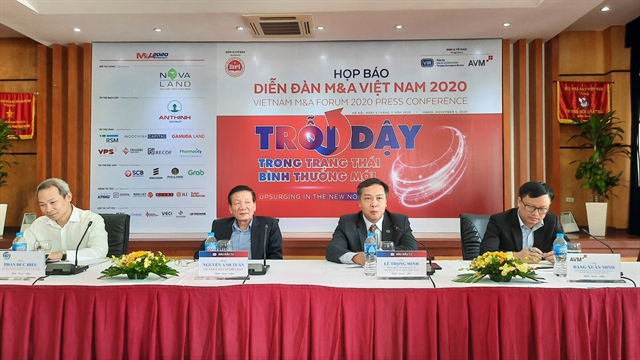Viet Nam’s merger and acquisition (M&A) market is considered the least affected among Southeast Asian countries since the onset of the COVID-19 pandemic, but in the new normal state, M&A value is expected to fall substantially to just US$3.5 billion in 2020.

Speakers at the press meeting. Viet Nam’s M&A value to shrink to $3.5 billion in 2020. — VNS Photo Mai Huong
Viet Nam’s merger and acquisition (M&A) market is considered the least affected among Southeast Asian countries since the onset of the COVID-19 pandemic, but in the new normal state, M&A value is expected to fall substantially to just US$3.5 billion in 2020.
This number is just 48.6 per cent of 2019’s value of $7.2 billion.
The pandemic continues to rage and has enormous impacts on the global market, taking its toll on the global M&A market.
Data by MergerMarket showed both deal volume and value declined in the first half of this year, with 6,938 deals worth $901.6 million, down 32 per cent in volume and 53 per cent in value year-on-year.
Speaking at the press meeting to introduce the M&A Vietnam Forum 2020 on Thursday, Le Trong Minh, editor-in-chief of Dau Tu (Investment) newspaper and head of the organising committee, said Viet Nam’s M&A market is entering a new stage – the new normal – which can see new opportunities.
After more than a decade of strong growth with thousands of transactions and total value of nearly $50 billion, M&A activities have proven an efficient channel of raising capital, contributing to Viet Nam’s economic restructuring and State-owned enterprises equitisation process.
“However, Viet Nam is emerging as a safe and attractive investment destination after successfully controlling the COVID-19 pandemic and many opportunities open up,” Minh said.
He emphasised the possible movements of capital out of big but unsafe markets, new free trade agreements such as the CPTPP and Viet Nam-EU Free Trade Agreement (EVFTA), the revision of many laws related to business and investment in which there are new regulations that are more open and transparent for M&A activities, and restructuring of value chains of many large corporations.
“The M&A wave will be delayed as buyers and sellers cannot meet due to the pandemic, making the deal take longer than expected. Meanwhile, domestic enterprises are trying to find ways to adapt and change business-investment strategies,” Minh said.
According to Dang Xuan Minh, chairman of AVM Vietnam, the COVID-19 pandemic and the new normal have impacted investors and businesses, driving them to adjust their strategies, increase restructuring activities but the due diligence and decision making are also more difficult.
Market insiders predicted M&A value in Viet Nam may reach $3-4 billion this year but Minh said the number could be higher if one or two high-value deals were inked.
In fact, M&A activities used to be dynamic in crisis periods when the sellers have motivation to restructure and streamline business under economic pressure. Current lockdowns in many countries are slowing M&A activities, but in the long term, the pandemic may drive the market to explode with rising demand from both sellers and buyers.
Data by AVM showed M&A activities are vigorous in the fields of real estate, finance-banking, industry, retail, logistics, agriculture and medical services. Foreign investors have also dominated the market with companies coming from Japan, South Korea, Thailand and Singapore.
However, Vietnamese companies are actively participating in the market as buyers. In 2018, only 18 per cent of deals were bought by Vietnamese firms while this rate during 2019-20 nearly doubled to 33 per cent.
Investors and businesses in Viet Nam still believe in the resilience of the M&A market in the post-pandemic period. According to CMAC Academy’s forecast, the market could see a V-shaped recovery in 2021-22 with value reaching $4.5-5 billion next year and $7 billion by 2022.
With the theme “Upsurging in the new normal”, M&A Vietnam Forum 2020, taking place on November 24 in HCM City, is expected to attract 500 representatives of domestic and international business and investment funds, who decide and make up 85 per cent of the value of the deals taking place in Viet Nam. — VNS




